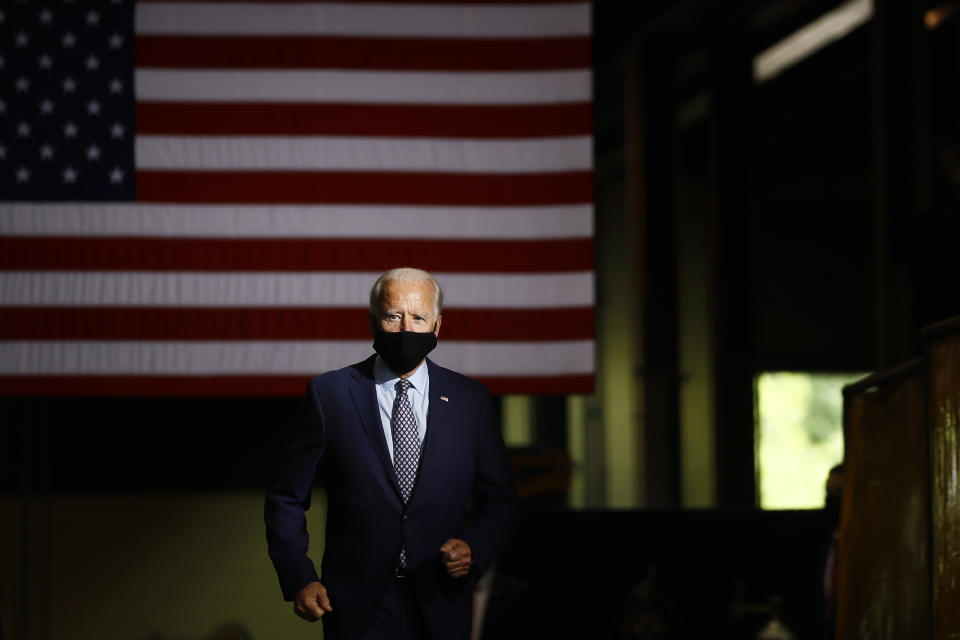How investors should think about the 2020 presidential election: Morning Brief
Monday, July 13, 2020
Get the Morning Brief sent directly to your inbox every Monday to Friday by 6:30 a.m. ET.
Wall St says stocks will either climb or present a buying opportunity
The U.S. presidential election is less than four months out.
And while some have posited that having a Democrat in the Oval Office is bad news for stocks, history suggests equity markets will do fine either way.
"In terms of US election risk,” wrote JPMorgan’s Marko Kolanovic, “our view that in the first order, there is no large difference between Trump and Biden when it comes to the overall impact on equity markets."
At the sector-level, different candidates pose different risks, Kolanovic added.
But for long-term investors in broad market indexes, both candidates present a mix of risks and opportunities that roughly net out. It’s a reassuring conclusion for investors as Biden has taken the lead in the polls. And it challenges assumptions that Republicans are good for business and Democrats are bad, as history shows stocks tend to rise regardless of what party the president belongs to.
In fact, JPMorgan analysts, as well as some of their peers on Wall Street, argue a resident Biden may be “neutral-to-positive for markets.”

“[Biden’s] published program entails a clear hit to corporate profits through higher taxes, but with eventual offsets such as redistribution to lower and middle-income households through a higher minimum wage and broader healthcare coverage, plus a national boost via infrastructure spending,” JPMorgan’s John Normand wrote on Friday. “A less-combative foreign policy seems guaranteed (which is bearish for volatility), though the odds of tariff rollback are tougher to handicap.”
That latter point is worth reiterating as the Trump administration’s trade war with China — and the tariffs and general uncertainty it has come with — has been flagged frequently as a top risk by investors and businesses.
Uncertainty
If anything, it’s the uncertainty surrounding the elections that may present the greater risk regardless of the outcome, as uncertainty was a more pronounced feature in financial markets around this time four years ago.
UBS analysts argue that uncertainty is once again playing a significant role in markets. And it is uncertainty that is at the center of the firm’s market framework, presented to clients on Thursday.
"Equity markets, we believe, would trade at a small (~2%) discount into the election,” UBS analysts led by Seth Carpenter wrote. “In a Trump status quo scenario the pre-election discount would reverse as fear of more regulation and taxes is unwound, but the upside is tempered by fear of renewed trade tension. In the case of the Biden/Dems sweep scenario, we would view markets down an additional 2-5% as the market prices more taxes. We would view that as a buying opportunity given that under our scenario there would be only a 1.5% tax hit to EPS, and higher aggregate demand and reduced policy uncertainty would both be offsetting tailwinds. In the Biden/divided Congress scenario, we model the market to be up 2-4% as it would get Biden's Trade policy but effectively Trump's status quo on fiscal policy."
UBS’s Biden/Dems sweep scenario is notable, because while it may be perceived as most bearish for big business and in turn the stock market, the analysts see a likely selloff as a “buying opportunity.”
There’s more to markets than the election
Goldman Sachs analysts also explored what the election mean for markets. And they observed that the premium for options around the Election Day are high.
But they don’t think this is about Biden vs. Trump.
“Election-period hedges are very expensive, primarily because of the market impact of the coronavirus,” Goldman Sachs’ analysts led by David Kostin wrote on Tuesday, noting that implied volatility in options pricing around the election is near its highest levels seen in the past decade.
“[H]owever, implied volatility is extremely high across tenors,” Kostin continued. “VIX futures of all maturities are 10-12 points higher than comparable futures were prior to the coronavirus crisis, compared with 2-3 points of extra volatility around the election – implying that most of the extra 4Q implied volatility is a result of the economic impact of the coronavirus.“ Emphasis ours.
And so even if you are convinced the presidential election will be net neutral for you portfolio, it’s just one of many risks to consider. Investing is hard.
By Sam Ro, managing editor. Follow him at @SamRo
What to watch today
Economy
2:00 p.m. ET: Monthly budget statement, June (-$863.0 trillion expected, $398.8 trillion in May
Earnings
6:00 a.m. ET: PepsiCo (PEP) is expected to report adjusted earnings per share of $1.25 on revenue of $15.39 billion
Top News
Stocks rise as third quarter earnings season begins [Yahoo Finance UK]
Jack Ma cashes out $9.6B from Alibaba [Yahoo Finance UK]
Wealthy just as worried about post-coronavirus future as everyone else: UBS survey [Yahoo Finance]
Analog Devices near deal to buy Maxim for $17 billion [Bloomberg]
YAHOO FINANCE HIGHLIGHTS
How the coronavirus outbreak has changed life for Sam's Club, and its shoppers
Chamath Palihapitiya: Facebook, Amazon, Google, face modern-day trustbusting
A property auction is coming to America’s wealthiest ZIP code —a first
—
Follow Yahoo Finance on Twitter, Facebook, Instagram, Flipboard, SmartNews, LinkedIn, YouTube, and reddit.
Find live stock market quotes and the latest business and finance news
For tutorials and information on investing and trading stocks, check out Cashay